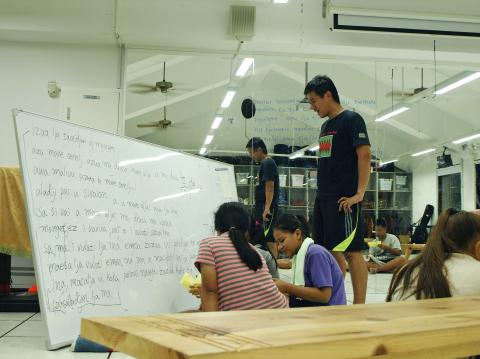Created by the National Chinese Orchestra Taiwan (NCO, 臺灣國樂團) for its 30th anniversary, Muliyav! Where Are You? (Muliyav在哪裡?) is an unusual musical about a Paiwan Aboriginal village.
Each one of the musical’s five acts is unscripted. Each is also sung in the Paiwan language, without subtitles, by members of the Paiwan Aboriginal tribe.
The narrative will be outlined in program notes and should be clear through inflection and body language, says NCO director Wu Ting-che (吳定哲).

Photo Courtesy of National Chinese Orchestra Taiwan
“It’s been a big undertaking. We’ve been preparing for roughly a year, starting with field research and then moving on to working with the cast in Pingtung,” Wu said.
The cast includes Golden Melody Award-winning Taiwu Children’s Ancient Ballads Troupe, along with tribal elders and other members of the Paiwan Aboriginal tribe of Pingtung County.
Onstage, they tell of a Paiwan village’s search for an itinerant deity called Muliyav.
According to Paiwan elders, a visit from the deity brings good luck and a bountiful harvest to the host village, while a prolonged absence bodes disaster. In the wake of Typhoon Morakot, a devastated village embarks on a search for Moliyav as they rebuild their lives.
“It’s a true story,” Wu said. “Because of that it’s a hopeful story, since no matter what, the people seem to have this optimism about the future. That’s the feeling we want to channel.”
Muliyav! Where Are You? premieres this month at the National Concert Hall with instrumental accompaniment by the NCO. Through trial and error, the orchestra has scored its classical Chinese instruments to match the tone and musical register of Paiwan songs, Wu said.
30 Years of Nco: An Exhibition
Also as part of its anniversary program, the NCO has opened an exhibition of documentary footage, scores, uniforms and other memorabilia to chart the ensemble’s shifting fortunes from 1984 to today.
“It wasn’t easy reaching 30. Times change and society changes,” Wu said.
“In the early days, we were under the Ministry of Education and mainly played a promotional role for classical Chinese instruments. Over time we’ve had to really adapt and move toward a role that’s more diverse,” Wu said.
Since the lifting of martial law, the NCO has been able to expand the concept of “national music” (國樂), previously defined as a classical Chinese repertoire.
Meanwhile, their audience has grayed, bringing budget woes.
Photographs in the exhibition record the NCO’s growing pains and various experiments, including use of the double bass and other western classical instruments to pad the lower register.
“We scrapped that last year because some in the audience kept saying how bizarre it was,” he said.
Over the last 20 years, the NCO has redirected toward commissioning local composers, training young conductors and developing a repertoire based on Hakka folk songs, Aboriginal worship music and other under-performed musical traditions.
“Currently, one of our missions is to be an international-level orchestra,” Wu said. “It’s also to be a Taiwanese ensemble, something based on the cultures that are here.”
Performance Notes:
What: Muliyav! Where Are You?
When: Sept. 27 at 7:30pm
Where: National Concert Hall (國家音樂廳), Taipei City
Tickets: NT$300 to NT$2,000, available through NTCH ticketing and online at www.artsticket.com.tw
Exhibition Notes:
What: The National Chinese Orchestra Taiwan 30th Anniversary Exhibition
When: Until Sept. 27
Where: Cultural Gallery (文化藝廊) in the National Concert Hall (國家音樂廳), Taipei City
Admission: Free

On April 26, The Lancet published a letter from two doctors at Taichung-based China Medical University Hospital (CMUH) warning that “Taiwan’s Health Care System is on the Brink of Collapse.” The authors said that “Years of policy inaction and mismanagement of resources have led to the National Health Insurance system operating under unsustainable conditions.” The pushback was immediate. Errors in the paper were quickly identified and publicized, to discredit the authors (the hospital apologized). CNA reported that CMUH said the letter described Taiwan in 2021 as having 62 nurses per 10,000 people, when the correct number was 78 nurses per 10,000

As we live longer, our risk of cognitive impairment is increasing. How can we delay the onset of symptoms? Do we have to give up every indulgence or can small changes make a difference? We asked neurologists for tips on how to keep our brains healthy for life. TAKE CARE OF YOUR HEALTH “All of the sensible things that apply to bodily health apply to brain health,” says Suzanne O’Sullivan, a consultant in neurology at the National Hospital for Neurology and Neurosurgery in London, and the author of The Age of Diagnosis. “When you’re 20, you can get away with absolute

May 5 to May 11 What started out as friction between Taiwanese students at Taichung First High School and a Japanese head cook escalated dramatically over the first two weeks of May 1927. It began on April 30 when the cook’s wife knew that lotus starch used in that night’s dinner had rat feces in it, but failed to inform staff until the meal was already prepared. The students believed that her silence was intentional, and filed a complaint. The school’s Japanese administrators sided with the cook’s family, dismissing the students as troublemakers and clamping down on their freedoms — with

As Donald Trump’s executive order in March led to the shuttering of Voice of America (VOA) — the global broadcaster whose roots date back to the fight against Nazi propaganda — he quickly attracted support from figures not used to aligning themselves with any US administration. Trump had ordered the US Agency for Global Media, the federal agency that funds VOA and other groups promoting independent journalism overseas, to be “eliminated to the maximum extent consistent with applicable law.” The decision suddenly halted programming in 49 languages to more than 425 million people. In Moscow, Margarita Simonyan, the hardline editor-in-chief of the